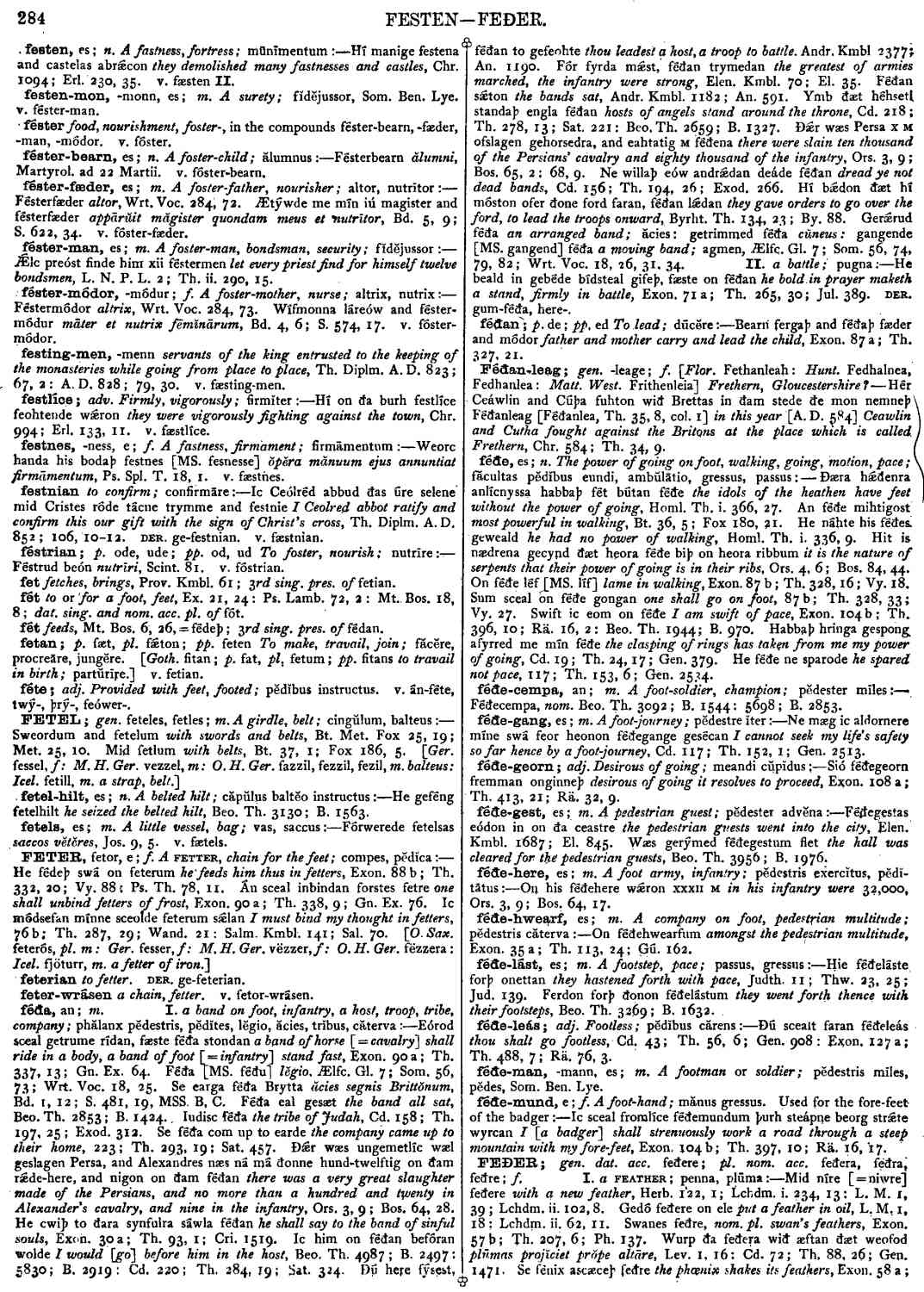féða
- noun [ masculine ]
-
Eórod sceal getrume rídan, fæste féða stondan
a band of horse [ = cavalry] shall ride in a body, a band of foot [ = infantry] stand fast,
- Exon. 90a ;
- Th. 337. 13 ;
- Gn. Ex. 64.
-
Féða [MS. féðu]
lĕgio.
- Ælfc. Gl. 7 ;
- Som. 56, 73 ;
- Wrt. Voc. 18, 25.
-
Se earga féða Brytta ăcies segnis Brittŏnum, Bd. 1, 12; S. 481, 19, MSS. B. C. Féða eal gesæt
the band all sat,
- Beo. Th. 2853 ;
- 8. 1424.
-
Iudisc féða
the tribe of Judah,
- Cd. 158 ;
- Th. 197, 25 ;
- Exod. 312.
-
Se féða com up to earde
the company came up to their home,
- 223 ;
- Th. 293, 19 ;
- Sae. 457.
-
Ðǽr wæs ungemetlíc wæl geslagen Persa, and Alexandres næs ná má ðonne hund-twelftig on ðam rǽde-here, and nigon on ðam féðan
there was a very great slaughter made of the Persians, and no more than a hundred and twenty in Alexander's cavalry, and nine in the infantry,
- Ors. 3, 9 ;
- Bos. 64, 28.
-
He cwiþ to ðara synfulra sáwla féðan
he shall say to the band of sinful souls,
- Exon. 30a ;
- Th. 93, 1 ;
- Cri. 1519.
-
Ic him on féðan befóran wolde
I would [go] before him in the host,
- Beo. Th. 4987 ;
- B. 2497: 5830 ;
- B. 2919: Cd. 220 ;
- Th. 284, 19 ;
- Sal. 324.
-
Dú here fýsest, féðan to gefeohte
thou leadest a host, a troop to battle.
- Andr. Kmbl 2377 ;
- An. 1190.
-
Fór fyrda mǽst, féðan trymedan
the greatest of armies marched, the infantry were strong,
- Elen. Kmbl. 70 ;
- El. 35.
-
Féðan sǽton
the bands sat,
- Andr. Kmbl. 1182 ;
- An. 591.
-
Ymb ðæt héhsetl standaþ engla féðan
hosts Of angels stand around the throne,
- Cd. 218 ;
- Th. 278, 13 ;
- Sat. 221: Beo. Th. 2659 ;
- B. 1327.
-
Ðǽr wæs Persa X M ofslagen gehorsedra, and eahtatig M féðena
there were slain ten thousand of the Persians' cavalry and eighty thousand of the infantry,
- Ors. 3, 9 ;
- Bos. 65, 2: 68, 9.
-
Ne willaþ eów andrǽdan deáde féðan
dread ye not dead bands,
- Cd. 156 ;
- Th. 194, 26 ;
- Exod. 266.
-
Hí bǽdon ðæt hí móston ofer ðone ford faran, féðan lǽdan
they gave orders to go over the ford, to lead the troops onward,
- Byrht. Th. 134, 23 ;
- By. 88.
-
Gerǽrud féða
on arranged band;
ăcies
: -
getrimmed féða
cŭneus
: -
gangende [MS. gangend] féða
a moving band;
agmen
,- Ælfc. Gl. 7 ;
- Som. 56, 74, 79, 82 ;
- Wrt. Voc. 18, 26, 31. 34.
-
He beald in gebéde bídsteal gifeþ, fæste on féðan
he bold in prayer maketh a stand, firmly in battle,
- Exon. 71a ;
- Th. 265, 30 ;
- Jul. 389.
Bosworth, Joseph. “féða.” In An Anglo-Saxon Dictionary Online, edited by Thomas Northcote Toller, Christ Sean, and Ondřej Tichy. Prague: Faculty of Arts, Charles University, 2014. https://bosworthtoller.com/10598.
Checked: 1